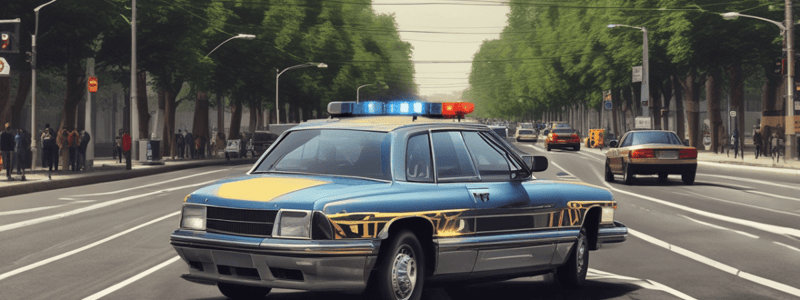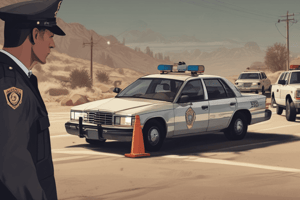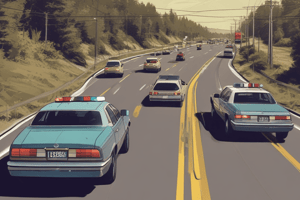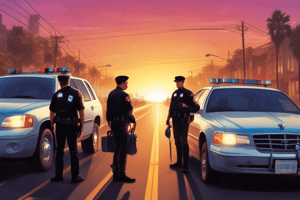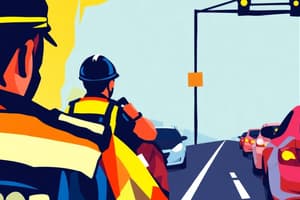Podcast
Questions and Answers
Under what circumstances may police be requested to attend a collision?
Under what circumstances may police be requested to attend a collision?
- If the collision is on a highway
- If the collision is blocking a Fire/EMS Station entrance (correct)
- If the collision is minor with no injuries
- If the collision is causing a traffic jam
What is the next step for vehicles that are not drivable due to extensive damage?
What is the next step for vehicles that are not drivable due to extensive damage?
- They are towed to a Collision Reporting Centre (correct)
- They are taken directly to a repair facility
- They are left at the scene of the collision
- They are taken to a nearby parking lot
Under what conditions can TFS depart from a collision scene without waiting for Police to arrive?
Under what conditions can TFS depart from a collision scene without waiting for Police to arrive?
- If the patient is still on the scene
- If the collision is minor with no injuries
- If there is a risk to public safety
- If the scene has been stabilized and there is no imminent risk to public safety (correct)
What is the operating schedule of the Collision Reporting Centres in Toronto?
What is the operating schedule of the Collision Reporting Centres in Toronto?
What is the final destination for vehicles that have been inspected at a Collision Reporting Centre?
What is the final destination for vehicles that have been inspected at a Collision Reporting Centre?
What happens if a collision involves a pedestrian, cyclist, or wheeled device?
What happens if a collision involves a pedestrian, cyclist, or wheeled device?
What should a driver do if they are involved in a collision that does not require police attendance?
What should a driver do if they are involved in a collision that does not require police attendance?
What is a requirement for police attendance at a collision?
What is a requirement for police attendance at a collision?
What happens if a driver refuses to attend a Collision Reporting Centre?
What happens if a driver refuses to attend a Collision Reporting Centre?
What is an example of a situation where police attendance is required?
What is an example of a situation where police attendance is required?
What should a TFS Officer do if a driver refuses to attend a Collision Reporting Centre?
What should a TFS Officer do if a driver refuses to attend a Collision Reporting Centre?
What is required for police attendance at a collision involving a TTC vehicle?
What is required for police attendance at a collision involving a TTC vehicle?
What happens if a collision occurs between 2300 and 0600 hours and any vehicle is not drivable?
What happens if a collision occurs between 2300 and 0600 hours and any vehicle is not drivable?
Flashcards are hidden until you start studying
Study Notes
Police Attendance
- Police will attend collisions involving injury, death, suspected criminal activity, suspected drug/alcohol consumption, or other specified circumstances.
- Police will also attend collisions involving TTC vehicles, federal/provincial/municipal vehicles, vehicles without insurance, and collisions with private/municipal property.
Collisions Requiring Police Attendance
- Injuries requiring hospitalization
- Death
- Suspected criminal activity
- Suspected drug/alcohol consumption
- TTC vehicles with reportable damage
- Federal/provincial/municipal vehicles
- Vehicles without insurance
- Collisions with private/municipal property
- Damage from a police pursuit
- Fail to remain collisions with suspect in proximity
- Lack of cooperation between parties
- Collisions involving dangerous goods
- Long Combination Vehicles (LCVs)
- Collisions between 2300 and 0600 hours where vehicles are not drivable
- Pedestrian, cyclist, and wheeled device collisions
Collision Reporting Centres (CRCs)
- Drivers should attend a CRC for incidents not requiring police attendance
- TFS officers may request police attendance if a driver refuses to attend a CRC
- Police may attend if a collision is interfering with emergency operations
- Towed vehicles must go directly to a CRC, and then may be towed to a repair facility after inspection
CRC Locations and Hours
- North District: 113 Toryork Dr., 416-808-3960, open 7 days a week, 8:00 a.m. to 10:00 p.m.
- East District: 39 Howden Rd., 416-808-4960, open 7 days a week, 8:00 a.m. to 10:00 p.m.
Studying That Suits You
Use AI to generate personalized quizzes and flashcards to suit your learning preferences.
